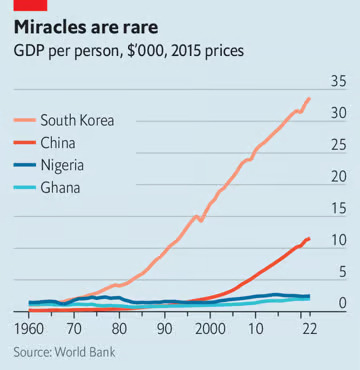Sevva, an upscale bar and restaurant boasting breathtaking views, has catered to bankers and tourists for over 15 years. From its terrace, patrons can gaze over a cocktail and through the windows of the adjacent hsbc office. The restaurant prides itself on offering cuisine that is “fresh, simple, and honest.” However, it comes at a price. An oversized dosa, a humble South Indian breakfast dish, will cost you hk$380 (almost $50). Some diners even opt to eat it with a knife and fork.
Unfortunately, in May, the restaurant will shutter its doors. This development has further dampened the spirits of Hong Kong’s beleaguered financial sector. The city’s primary stock market index has plummeted by over a quarter since late January. Meanwhile, the index for smaller “growth” enterprises is languishing below the low point it hit in October 2022, before China eased the quarantine restrictions that had deprived Hong Kong of visitors.

In the face of prevailing pessimism, the funds raised through initial public offerings amounted to just hk$37bn in the first 11 months of 2023 (refer to the chart), marking the lowest in two decades. Exchange Square, where the bourse is situated, has been described by some Mainlanders as a “ruin.” In contrast to New York’s financial district, featuring a bronze statue of a charging bull, the square showcases two bronze water buffalo, with one lying flat.
Financial services contribute to over a fifth of Hong Kong’s GDP, making it challenging for the city to prosper when its banking sector faces difficulties. Forecasts in July anticipated Hong Kong’s economy to grow by 6% in 2023, but the consensus now stands at only 3.3%. This implies that Hong Kong’s GDP is smaller than it was in 2018, the year preceding the outbreak of anti-government protests, reflecting a lost half-decade.
Even Hong Kong’s notoriously expensive property market has not been spared, with prices falling by almost 20% since their peak. In October, the city halved stamp duty for foreign buyers and buyers of multiple properties, marking the first relaxation of property-buying curbs since 2010, as noted by Capital Economics.
What explains Hong Kong’s challenges? Sevva’s founder cited the COVID-19 pandemic and the “social movements of 2019,” which “posed enormous challenges” to the restaurant’s operations. In response to protests against the mainland’s growing influence, China’s government imposed a strict national-security law, further eroding the city’s autonomy. This has made it more difficult for Hong Kong to fulfill its coveted role as a “superconnector” between China and the rest of the world. John Lee, the city’s leader, couldn’t attend the APEC forum in San Francisco in November due to American sanctions.
Despite efforts by authorities to bring Hong Kong and the mainland closer since quelling the protests, foreign investors increasingly see little distinction between Hong Kong and the rest of China.
However, the reality is that Hong Kong’s financial industry and property market remained robust after the introduction of the national-security law in June 2020. For instance, IPOs brought in almost hk$329bn in 2021, a 15% increase from 2018. Property prices did not peak until the end of 2021.
China’s crackdown on Hong Kong has likely inflicted less immediate harm on the territory’s financial markets than another crackdown: Beijing’s regulatory campaign against mainland property developers and internet firms, many of which are listed in Hong Kong. Strict financial limits imposed on developers triggered a wave of defaults on bonds issued in Hong Kong. Investors learned that unsecured debt issued offshore by a mainland company’s subsidiary or offshoot ranks low in the pecking order during crises.
In addition to diminished autonomy from the mainland, Hong Kong also lacks autonomy from America’s Federal Reserve. To maintain its currency peg to the dollar, the city had to sharply raise interest rates, impacting the property market and the broader economy. The high cost of capital may have encouraged firms to deplete their inventories, contributing to the sharp slowdown in growth in the second quarter, according to Goldman Sachs.
The currency peg has also led to Hong Kong losing competitiveness against some neighbors. Its currency has appreciated by 6% against the yuan since the end of January, even as prices in China have been falling. Weak exports and strong imports are likely to subtract more than two percentage points from Hong Kong’s growth this year. Hong Kong is not merely another Chinese city; otherwise, it would have a more competitive currency.
Days of being wild
A year after China lifted its quarantine measures, Hong Kong’s boutiques, hotels, and restaurants anticipated an influx of mainland visitors. However, in the first ten months of the year, only 21 million arrived, accounting for 52% of the number in the same period in 2018. These visitors are also displaying reduced spending habits, with some opting to open bank accounts and purchase life insurance policies to leverage the city’s higher interest rates.
Contrary to expectations of mainlanders flocking to Hong Kong, the city’s residents are now traveling in the opposite direction. Departures, mostly to other parts of China, outnumber mainland arrivals by almost three to one, as highlighted by Citigroup. After a recent visit to Hong Kong, John Greenwood, one of the architects of the territory’s dollar peg, drew parallels with historical episodes when British consumers crossed the Channel to France for alcohol and food purchases.
Despite the prevailing gloom, there is an upside. If the Fed indeed cuts interest rates in 2024, as anticipated by futures markets, Hong Kong’s domestic economy is poised to respond robustly. As financial conditions ease and Hong Kong’s currency weakens, the prospect of revived deals and increased visitors becomes more likely. While the city bids farewell to one of its iconic restaurants, its enduring appeal as a global destination, where people can savor a taste of Asia without abandoning familiar utensils, remains intact.

